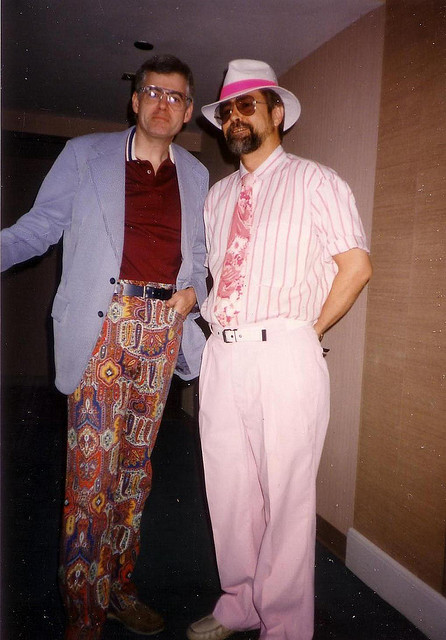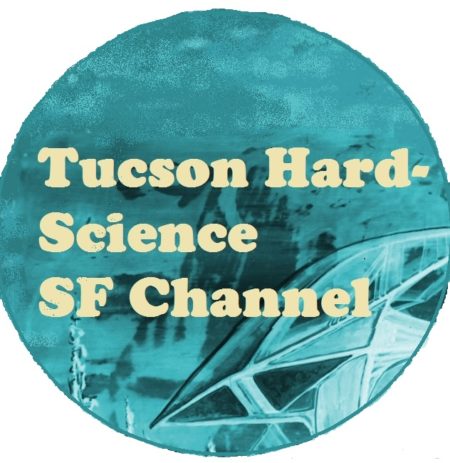 David G. Hartwell, who would have turned 75 this summer, attended his first ICFA in Boca Raton in 1984—only the fifth conference—and immediately earned his place in conference folklore when he and Justin Leiber (Fritz’s son; they were both guests that year) conspired to bum-rush the then-president Marshall Tymn into the hotel pool one evening. There were good reasons for this, from David’s point of view, but there were also good reasons for David to continue attending the conference almost yearly, except for ICFA’s brief exile to Texas. And the more he attended, the more such stories gathered around him. He really did sing “Teen Angel” to a riverboat full of tourists, including Doris Lessing, and he really was along on what became known as the “Heart of Darkness” water taxi cruise with Philip Jose Farmer and his wife and a few of the rest of us. And, of course, he really did own all those clothes. As he once explained to me, “You need to have good taste to do bad taste well.”
David G. Hartwell, who would have turned 75 this summer, attended his first ICFA in Boca Raton in 1984—only the fifth conference—and immediately earned his place in conference folklore when he and Justin Leiber (Fritz’s son; they were both guests that year) conspired to bum-rush the then-president Marshall Tymn into the hotel pool one evening. There were good reasons for this, from David’s point of view, but there were also good reasons for David to continue attending the conference almost yearly, except for ICFA’s brief exile to Texas. And the more he attended, the more such stories gathered around him. He really did sing “Teen Angel” to a riverboat full of tourists, including Doris Lessing, and he really was along on what became known as the “Heart of Darkness” water taxi cruise with Philip Jose Farmer and his wife and a few of the rest of us. And, of course, he really did own all those clothes. As he once explained to me, “You need to have good taste to do bad taste well.”
In 1995, Bob Collins and I invited him to join the conference board and take over management of the book room, which had been something of a haphazard affair before then. For many conference members, this was their first encounter with David, whose connections in New York publishing and particularly with Tor have for years provided ICFA with many of the free books that showed up at luncheons and banquets. The book room itself grew into one of the main attractions of the conference.
David believed in ICFA; he wrote that it had become an “umbrella for the marginalized study of the fantastic, and that it was worth supporting.” This, I think, helps explain the apparent paradox of the two Davids.
And that paradox is this: for many ICFA attendees, including some well-known scholars, David was the colorfully-dressed, urbane, and very knowledgeable guy who ran the book room, who had done some of those darkly outrageous things in the early history of the conference, and who was Peter and Elizabeth’s dad.
But for most of the writers attending and at least a few of us academics–the list of names is too long to even begin here–ICFA had somehow snagged one of the great legendary editors in the history of science fiction as a regular attendee and as, of all things, the book room manager. He did this for more than twenty years, and the influence he had in bringing more and more distinguished writers to the conference is inestimable.
Academics and literary historians tend to focus on writers, for obvious reasons: they’re easier to research. In the science fiction field, an occasional editor like Hugo Gernsback or John W. Campbell, Jr. or Michael Moorcock might show up on the radar, but anthologists and novel editors are far less visible. But those who know the real history of science fiction (and fantasy, and horror) know that David Hartwell is a name that belongs in that pantheon. He not only edited writers as diverse as Gene Wolfe, Gregory Benford, Michael Bishop, Robert Sawyer, and L.E.Modesitt, but he won three Hugo and two World Fantasy Awards, and one of the latter was for The Dark Descent, an anthology which did as much to define modern horror fiction as any other single book. His equally massive science fiction anthologies, sometimes co-edited with Kathryn Cramer, more recently with Patrick Nielsen Hayden, made coherent and pointed arguments for the kind of science fiction David believed in. He edited nine years of Best Fantasy annuals and eighteen years of Best Science Fiction annuals. He co-founded one of the important critical magazines in the field, The New York Review of Science Fiction. He wrote a still-useful popular introduction to science fiction, Age of Wonders.
He shaped the field as much as anyone else has in the last half-century.
And he was the guy in the book room. A couple of years ago, David told me with some glee that one of the more prominent ICFA scholars, who had read a lot of theory but only recently begun researching the details of the literary history of science fiction, had come up to him and said, with some surprise, “It seems like you’re a pretty important guy.” She was even more surprised to learn he had a doctorate in medieval literature.
He didn’t seem to mind much, being the guy in the book room, but we all should have asked him more questions than we did. I knew David for over thirty years, and didn’t always agree with his ideas about science fiction or fantasy, but I never failed to learn something new from him just about every time we talked. We’ve lost a lot of the history of SF, as well as a congenial guy with unaccountable passions for indescribable wardrobes and teen death songs. And we have lost a huge and largely unsung part of what has helped knit ICFA together over all these years.
–Gary K. Wolfe


 Fix, Grist’s solutions lab, amplifies bold, equitable ideas for our climate future, and the people working towards them, in an effort to shift the climate narrative toward possibility. Through creative storytelling, network-building, and events, Fix explores the paths to a clean, green, just future, and brings together a growing community of climate visionaries — we call them Fixers — who are leading the way to a planet that works for everyone.
Fix, Grist’s solutions lab, amplifies bold, equitable ideas for our climate future, and the people working towards them, in an effort to shift the climate narrative toward possibility. Through creative storytelling, network-building, and events, Fix explores the paths to a clean, green, just future, and brings together a growing community of climate visionaries — we call them Fixers — who are leading the way to a planet that works for everyone.